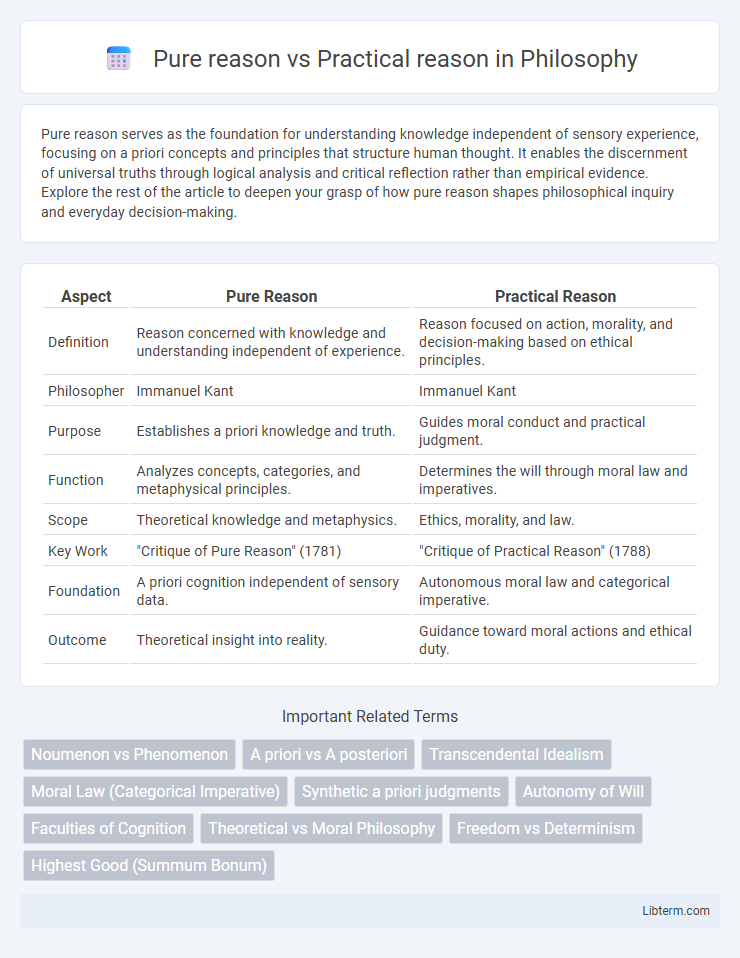Pure reason serves as the foundation for understanding knowledge independent of sensory experience, focusing on a priori concepts and principles that structure human thought. It enables the discernment of universal truths through logical analysis and critical reflection rather than empirical evidence. Explore the rest of the article to deepen your grasp of how pure reason shapes philosophical inquiry and everyday decision-making.
Table of Comparison
| Aspect | Pure Reason | Practical Reason |
|---|---|---|
| Definition | Reason concerned with knowledge and understanding independent of experience. | Reason focused on action, morality, and decision-making based on ethical principles. |
| Philosopher | Immanuel Kant | Immanuel Kant |
| Purpose | Establishes a priori knowledge and truth. | Guides moral conduct and practical judgment. |
| Function | Analyzes concepts, categories, and metaphysical principles. | Determines the will through moral law and imperatives. |
| Scope | Theoretical knowledge and metaphysics. | Ethics, morality, and law. |
| Key Work | "Critique of Pure Reason" (1781) | "Critique of Practical Reason" (1788) |
| Foundation | A priori cognition independent of sensory data. | Autonomous moral law and categorical imperative. |
| Outcome | Theoretical insight into reality. | Guidance toward moral actions and ethical duty. |
Understanding Pure Reason: A Theoretical Foundation
Pure reason involves the a priori principles that structure human cognition independently of sensory experience, forming the theoretical foundation of knowledge. It seeks to establish universal truths through concepts such as space, time, and causality, enabling critical analysis beyond empirical data. Understanding pure reason is essential for grasping Kant's framework on how the mind synthesizes experiences to generate objective knowledge.
Defining Practical Reason: Navigating Action and Ethics
Practical reason directs decision-making by applying moral principles to real-world actions, emphasizing the role of ethical deliberation in guiding behavior. It involves evaluating circumstances and possible outcomes to determine the most ethical course, balancing personal values with societal norms. This rational process contrasts with pure reason's abstract theorizing, focusing instead on concrete responsibilities and the pursuit of moral good in everyday life.
Historical Background: Kant’s Distinction
Immanuel Kant's distinction between pure reason and practical reason originates from his critical philosophy in the late 18th century, particularly articulated in the "Critique of Pure Reason" (1781) and the "Critique of Practical Reason" (1788). Pure reason governs theoretical knowledge and the understanding of phenomena, seeking objective truths independent of experience. Practical reason addresses moral principles and human action, emphasizing autonomy and the categorical imperative as foundational to ethical decision-making.
Core Principles of Pure Reason
Pure reason centers on a priori knowledge, emphasizing the innate structures of understanding and the conditions for the possibility of experience. It investigates phenomena through categories like causality, substance, and unity without reliance on sensory input, seeking universal and necessary truths. This contrasts with practical reason, which deals with moral laws and action based on autonomy and the categorical imperative.
Core Principles of Practical Reason
Practical reason centers on guiding action through moral principles, emphasizing duties and the will's alignment with universal maxims, while pure reason focuses on knowledge acquisition and understanding beyond empirical experience. The core principles of practical reason include the categorical imperative, which commands actions that can be universally applied without contradiction, and the autonomy of the will, asserting that moral agents legislate moral laws through rationality. These principles underscore the foundation of ethical decision-making, promoting moral obligations grounded in reason rather than contingent outcomes.
Key Differences Between Pure and Practical Reason
Pure reason involves the use of intellectual faculties to gain knowledge independent of sensory experience, emphasizing theoretical understanding and abstract principles. Practical reason, on the other hand, centers on decision-making and guiding actions based on moral laws or objectives, prioritizing ethical considerations over empirical evidence. The key differences lie in pure reason's aim for truth and knowledge, whereas practical reason aims to determine the will and guide behavior.
Practical Applications of Pure Reason
Practical applications of Pure Reason extend to areas such as ethical decision-making, where it provides a foundational framework for determining moral principles through rational analysis rather than empirical observation. In legal theory, Pure Reason supports the development of universal laws by grounding justice in objective rationality, independent of subjective experience. Furthermore, in scientific methodology, Pure Reason guides hypothesis formation and logical deduction, ensuring coherent and consistent theories beyond mere sensory data.
Real-World Impact of Practical Reason
Practical reason directly influences decision-making by applying ethical principles to real-world scenarios, shaping laws, policies, and personal conduct. Unlike pure reason, which deals with abstract concepts and theoretical knowledge, practical reason bridges philosophy and action through moral judgment and purposeful behavior. Its real-world impact is evident in promoting social justice, guiding responsible leadership, and fostering ethical innovation across diverse sectors.
Philosophical Debates: Integrating Both Forms of Reason
Philosophical debates on pure reason versus practical reason center on their distinct yet complementary roles in epistemology and ethics, where pure reason governs theoretical knowledge and metaphysical inquiry while practical reason directs action and moral judgments. Integrating both forms of reason involves balancing Kantian distinctions between understanding the world as it is and deciding how to act within it, fostering a unified framework that addresses truth and value simultaneously. Recent discourse explores how this synthesis enhances critical thinking, enabling more coherent ethical theories and informed decision-making processes grounded in rationality across abstract and applied domains.
The Continuing Relevance of Pure vs Practical Reason
Pure reason, concerned with theoretical knowledge and abstract principles, remains foundational in shaping ethical frameworks and epistemological inquiry. Practical reason, which governs decision-making based on moral and pragmatic considerations, continuously influences contemporary debates on autonomy, justice, and human behavior. The ongoing discourse between pure and practical reason underscores their enduring impact on philosophy, law, and cognitive sciences.
Pure reason Infographic

 libterm.com
libterm.com